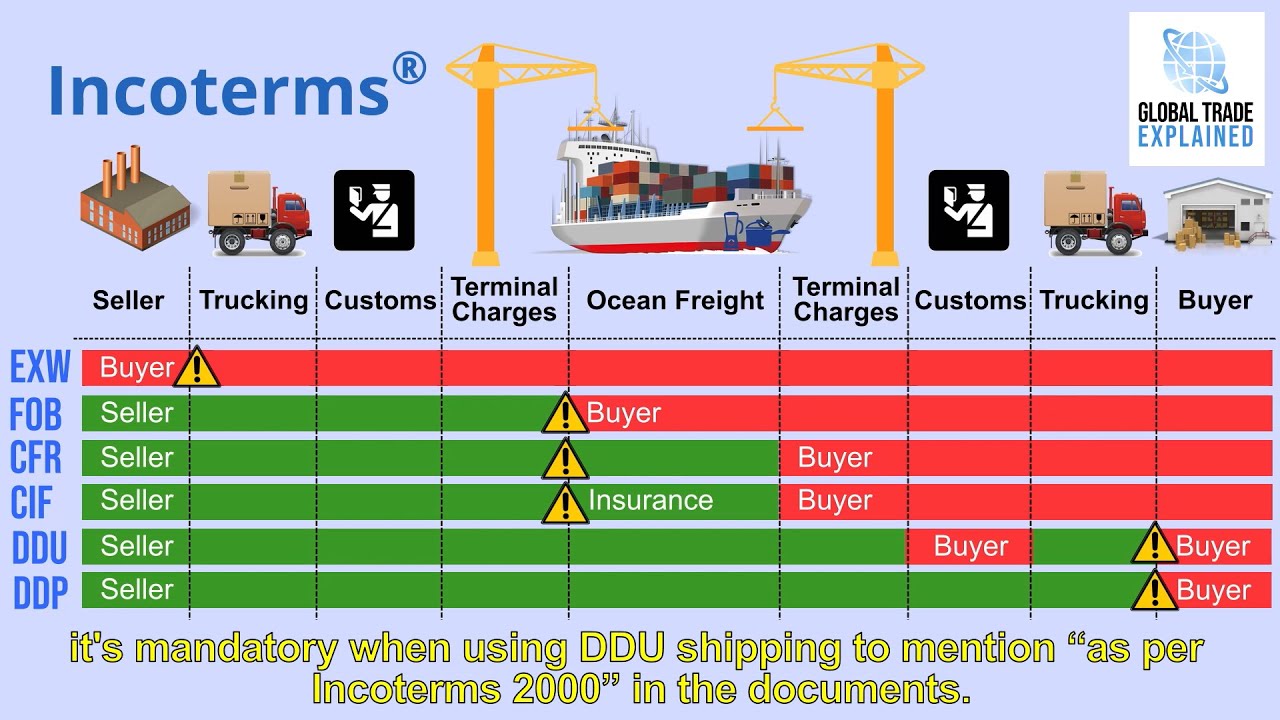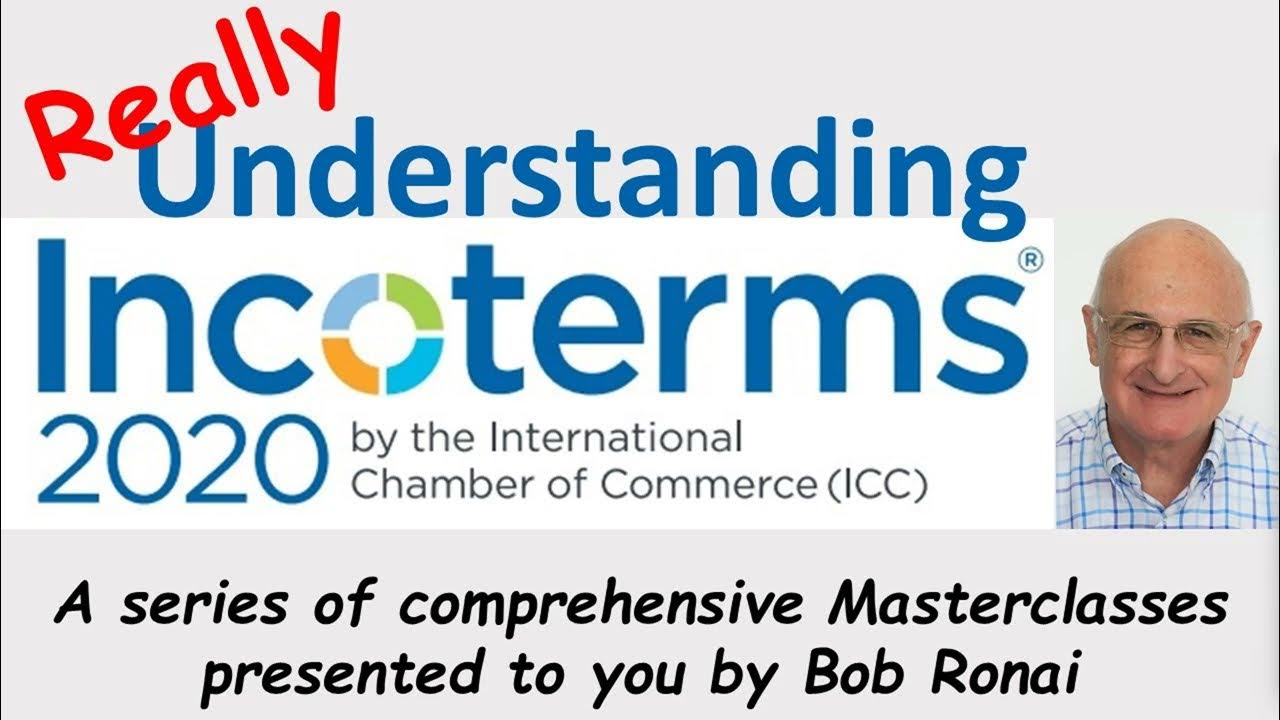Incoterms 2020 detailed explanation
Summary
TLDRThis video provides a comprehensive guide to Incoterms 2020, the internationally recognized rules defining the responsibilities of buyers and sellers in global trade. It explains the purpose of Incoterms, highlights key delivery terms such as EXW, FCA, FOB, CIF, DDP, and introduces the new DPU term replacing DAT. The guide clarifies how costs, risks, and insurance obligations are divided between parties and outlines significant updates from Incoterms 2010, including enhanced insurance coverage under CIP. Understanding these rules is crucial for smooth international transactions, minimizing disputes, and ensuring clarity in the transfer of goods, costs, and responsibilities.
Takeaways
- 😀 Incoterms 2020, published by the ICC, came into effect on January 1, 2020, updating global trade rules that have been in place since 1936.
- 😀 Incoterms are essential for international trade, defining the responsibilities, costs, and risks associated with the delivery of goods between buyers and sellers.
- 😀 The 11 Incoterms in 2020 cover various modes of transportation and define key responsibilities, including where and when risks transfer from seller to buyer.
- 😀 EXW (Ex Works) places all responsibility on the buyer, as the seller only needs to make the goods available at their premises or another named location.
- 😀 FOB (Free On Board) and FAS (Free Alongside Ship) involve the seller delivering goods at or near the ship, with risk transferring once the goods are onboard or alongside.
- 😀 CIF (Cost, Insurance, and Freight) and CIP (Carriage and Insurance Paid) require the seller to pay for shipping and insurance, with CIP offering higher insurance coverage under the new rules.
- 😀 DAP (Delivered at Place) and DPU (Delivered at Place Unloaded) describe scenarios where the seller is responsible for delivery and unloading, with DPU replacing the outdated DAT term.
- 😀 DDP (Delivered Duty Paid) is the most comprehensive term, where the seller bears all costs, including import duties, until the goods reach the destination and are ready for unloading.
- 😀 Incoterms 2020 introduces DPU, replacing DAT (Delivered at Terminal), to eliminate confusion related to delivery locations and clarify that any place can be the delivery point.
- 😀 The key difference between CIF and CIP is the level of insurance required, with CIP requiring higher insurance coverage (Institute Cargo Clause A) for the buyer’s benefit.
Q & A
What are Incoterms and why are they important in international trade?
-Incoterms (International Commercial Terms) are standardized rules published by the International Chamber of Commerce (ICC) that define the responsibilities, costs, and risks of buyers and sellers in international transactions. They are important because they reduce ambiguity, clarify risk transfer points, and are recognized globally by governments and legal authorities.
When were Incoterms first published and when did the latest version come into effect?
-Incoterms were first published in 1936. The latest version, Incoterms 2020, came into effect on 1st January 2020.
What is the main purpose of specifying Incoterms in a sales contract?
-The main purpose is to clearly define which party is responsible for transportation costs, insurance, customs clearance, and at what point the risk of loss or damage to goods transfers from the seller to the buyer.
What does EXW (Ex Works) mean for the seller and the buyer?
-Under EXW, the seller makes the goods available at their premises or another named place. The seller is not responsible for loading or export clearance. The buyer bears all costs and risks from that point onward.
How does the DPU term in Incoterms 2020 differ from the old DAT term?
-DPU (Delivered at Place Unloaded) replaces DAT (Delivered at Terminal). DPU clarifies that goods can be delivered unloaded at any named place, not just at terminals, removing previous confusion associated with the word 'terminal.'
What are the key differences in insurance requirements between CIF and CIP?
-Both CIF (Cost, Insurance, and Freight) and CIP (Carriage and Insurance Paid To) require the seller to obtain insurance. In Incoterms 2020, CIF still requires minimum insurance, while CIP requires higher coverage complying with Institute Cargo Clause A. Other terms do not require seller-provided insurance.
What does FOB (Free On Board) specify regarding risk transfer?
-Under FOB, the seller delivers the goods on board the vessel at the named port of shipment. The risk of loss or damage transfers to the buyer once the goods are on board, and the buyer bears all subsequent costs.
How does the seller’s responsibility differ between DAP and DDP?
-Under DAP (Delivered At Place), the seller delivers the goods ready for unloading at the named place, bearing all risks until that point. Under DDP (Delivered Duty Paid), the seller also clears the goods for import, pays all duties, and bears all costs and risks until the goods reach the named destination ready for unloading.
Why is it recommended to specify the exact delivery point within FCA (Free Carrier)?
-Specifying the exact delivery point ensures clarity on when risk transfers from the seller to the buyer, reducing the likelihood of disputes and misunderstandings regarding responsibilities and costs.
Which Incoterms are applicable for any mode of transport and which are limited to sea and inland waterway transport?
-Seven Incoterms are applicable for any mode of transport: EXW, FCA, CPT, CIP, DAP, DPU, and DDP. Four Incoterms are specific to sea and inland waterway transport: FAS, FOB, CFR, and CIF.
How have Incoterms 2020 updates addressed transport documentation issues?
-Incoterms 2020 clarify responsibilities when goods are handed to intermediary transport providers (e.g., trucks) so that carriers can issue bills of lading properly, reducing confusion and disputes in documentation.
Outlines

Esta sección está disponible solo para usuarios con suscripción. Por favor, mejora tu plan para acceder a esta parte.
Mejorar ahoraMindmap

Esta sección está disponible solo para usuarios con suscripción. Por favor, mejora tu plan para acceder a esta parte.
Mejorar ahoraKeywords

Esta sección está disponible solo para usuarios con suscripción. Por favor, mejora tu plan para acceder a esta parte.
Mejorar ahoraHighlights

Esta sección está disponible solo para usuarios con suscripción. Por favor, mejora tu plan para acceder a esta parte.
Mejorar ahoraTranscripts

Esta sección está disponible solo para usuarios con suscripción. Por favor, mejora tu plan para acceder a esta parte.
Mejorar ahoraVer Más Videos Relacionados

Lesson 1 - Introduction to the Incoterms® 2020 rules

Incoterms (International commercial Terms) 2020 #1 Ekspor Impor

Incoterms® 2020 Explained for Import Export Global Trade

Incoterms for beginners | Global Trade Explained

Lesson 11 DPU part 1

Explained about basic INCOTERMS for beginners! EXW/FOB/CFR/CIF/DAP/DDP.
5.0 / 5 (0 votes)
